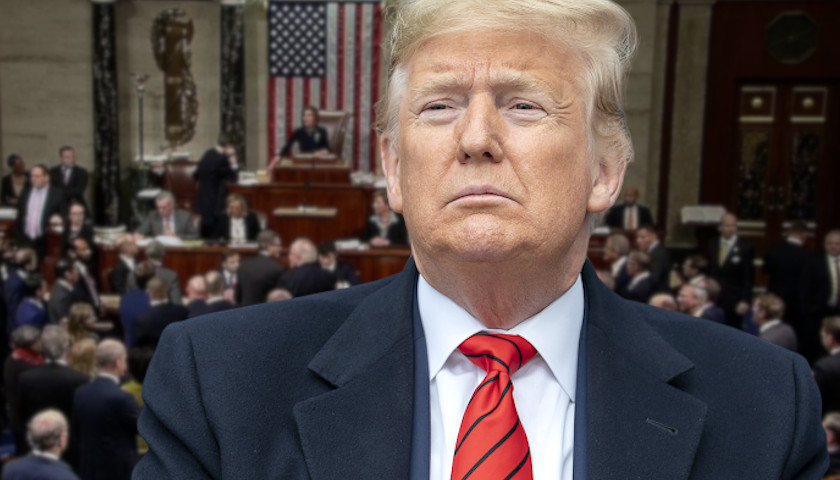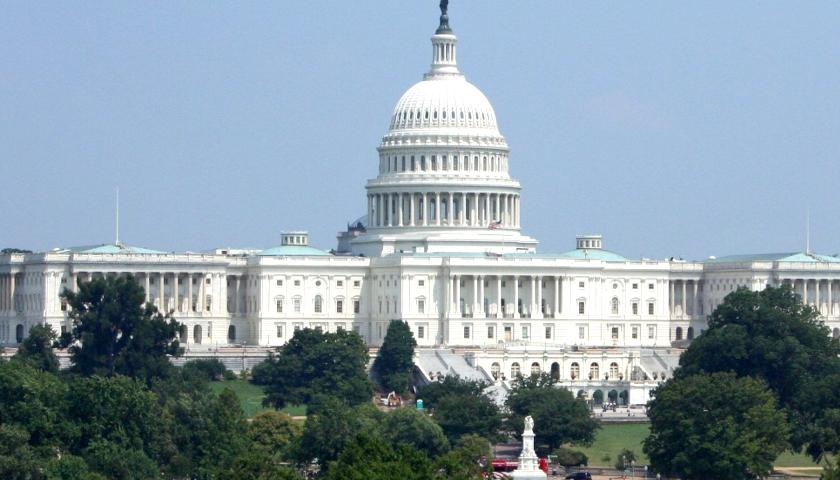by Anna Lynn
During the throes of the Senate impeachment trial, the Associated Press has published a fact check that claims President Trump is giving a “false account” and making “distorted statements” about “the circumstances that got him impeached.” This AP article is riddled with unsubstantiated assertions, gross mischaracterizations, and blatant falsehoods. Furthermore, dozens of news outlets are carrying the AP story, thus multiplying the reach of its misinformation.
In an article titled “Trump’s False Account of Ukraine Episode,” AP reporters Calvin Woodward and Hope Yen claim that President Trump’s stated motive for releasing the transcript of his July 25th phone call with President Zelensky is “demonstrably untrue” and “easily refuted by the calendar.” This is because Trump said that if he “didn’t release” the transcript, people would believe false portrayals of the call, like the one that Democrat Congressman Adam Schiff made at the opening of the House’s whistleblower hearing.
However, the AP’s quote of Trump actually undermines the AP’s argument. Trump stated, “I released the conversation, because if I didn’t release it, people would have said that I made the statement that he made. This guy is a fraud,” referring to Schiff. Trump’s words, particularly the phrase “would have said,” reveal that he anticipated his political opponents would mischaracterize the phone call, which is exactly what Schiff did just one day after the transcript release.
The AP also ignores the fact that media outlets had begun distorting the call before Trump released the transcript. For example, four days before Trump released it, the Wall Street Journal reported that Trump “repeatedly pressured” Zelensky “to investigate Joe Biden’s son” during the call, “urging” him “about eight times to work with Rudy Giuliani on a probe that could hamper Mr. Trump’s potential 2020 opponent.” Yet, the call transcript shows no evidence of pressure, and the claim of “eight times” is a complete fabrication. The totality of Trump’s statements about Biden, which are interspersed with comments by Zelensky, are as follows:
- “There’s a lot of talk about Biden’s son, that Biden stopped the prosecution and a lot of people want to find out about that so whatever you can do with the Attorney General would be great. Biden went around bragging that he stopped the prosecution so if you can look into it … It sounds horrible to me.”
- “I will have Mr. Giuliani give you a call and I am also going to have Attorney General Barr call and we will get to the bottom of it. I’m sure you will figure it out. I heard the prosecutor was treated very badly and he was a very fair prosecutor so good luck with everything.”
- “I will tell Rudy and Attorney General Barr to call.”
In sum, people were misrepresenting the phone call, Trump saw this occurring, and he declassified the transcript to combat these and future allegations. Trump’s suspicions were confirmed one day later when Schiff distorted the call during a broadly televised Congressional hearing.
The AP also spreads Schiff’s falsehood that his description of the Trump-Zelensky call was simply a “parody” and that Schiff “made clear in the hearing he was not to be taken literally.” The truth is that Schiff claimed his statements were a “parody” only after Republican Congressman Mike Turner challenged him an hour later into the hearing. More significantly, a parody is defined by its “comic effect” or “ridiculous imitation.” Schiff’s statements, detailed below, have neither of these qualities. Schiff later called impeachment a “solemn action,” which further undercuts the notion that this was a parody.
Likewise, the AP uncritically relays Schiff’s claim that he was conveying “the essence” or the “sum and character” of what “the President was trying to communicate.” Yet, Schiff’s description is in conflict with the reality of what occurred:
- Schiff alleges that the call transcript reads like “an organized crime shakedown” where Trump asks Zelensky “seven times” to “make up dirt on my political opponent.” Trump does not ask Zelensky to “make up dirt” on anyone. Trump requests an investigation into the Bidens for possible corruption, stating “whatever you can do with the Attorney General would be great.”
- According to Schiff, Trump tells Zelensky, “Don’t call me again. I’ll call you when you’ve done what I asked.” In reality, Trump says, “feel free to call,” and “I look forward to seeing you in Washington and maybe in Poland.”
Importantly, Schiff uttered these falsehoods at the opening of a widely televised hearing. ABC, CBS, NBC, CNN, CNN en Espanol, Fox News, MSNBC, and C-SPAN all dropped regularly-scheduled programming to air the hearing live.
Casting aspersion on Trump’s motives for delaying aid to Ukraine, the AP writes that “previous rounds of assistance were not similarly disrupted.” This half-truth leaves out the fact that the President has held up foreign aid to an array of countries to ensure that U.S. interests are served. He has done this with Afghanistan, El Salvador, Honduras, Guatemala, Lebanon, and Pakistan.
The AP also cites Trump’s oft-repeated statement, “I would like you to do us a favor,” as evidence of Trump pressuring Ukraine to investigate Biden. In doing so, the AP takes Trump grossly out of context, as the rest of his sentence says, “because our country has been through a lot, and Ukraine knows a lot about it. I would like you to find out what happened with this whole situation with Ukraine, they say CrowdStrike.” This is the private company that investigated the hack of the Democratic National Committee’s email servers. which the DNC refused to provide to the FBI. Trump then says, “The server, they say Ukraine has it.”
Thus, the “favor” is a request for Ukraine to help investigate 2016 election interference, which is exactly what the Democrats spent two years doing. In fact, three Democratic Congressmen sent a letter to the government of Ukraine in 2018 stating that “we strongly encourage you” to cooperate with the Mueller investigation.
This AP “fact check” also claims that Trump “dangles the possibility of a White House visit for Zelensky,” naming it as another instance of Trump pressuring for investigations. However, the AP fails to mention that Trump committed to meet with Zelensky three months earlier in April of 2019, and the transcript provides no evidence that a meeting was “dangled.” In fact, Trump offered to meet on Zelensky’s terms, stating: “Whenever you would like to come to the White House, feel free to call. Give us a date and we’ll work that out. I look forward to seeing you.”
The AP attempts to debunk Trump’s statement that he held up Ukrainian aid to ensure that other countries contributed more to helping the Ukraine. The article claims that other countries have “provided far more developmental assistance” to Ukraine than the United States. It also states that the EU has provided “more than $16 billion” to help Ukraine since 2014 and that NATO “contributes a variety of military-assistance programs and trust funds.” However, the AP provides no hyperlink or documentation for these assertions, does not explain any context for the aid, and neglects to reveal that the U.S. provides 22% of NATO’s direct funding and 67% of its indirect funding. Most importantly—the AP fails to mention that Zelensky himself emphatically confirms Trump’s statement.
On their phone call, Zelensky said he agreed “not only 100%, but actually 1,000%” with Trump’s assertion that other countries are not doing their fair share to help Ukraine. When Trump states that the U.S. spends “much more” effort and time to help Ukraine than many European countries and that “they should be helping you more than they are,” Zelensky responds, “Yes you are absolutely right” and “the European Union should be our biggest partner, but technically the United States is a much bigger partner.” Contrary to the AP’s unsupported narrative, President Zelensky’s appraisal of Ukraine’s foreign support directly aligns with Trump’s concerns.
The article also criticizes President Trump for claiming that Zelensky said the phone call was “perfect.” Although Zelensky never used the word “perfect,” Trump is conveying the essence of Zelensky’s statements. Unlike Adam Schiff’s definition of “essence,” the President’s characterization is accurate. Zelensky has made public statements denying any pressure, bribery, extortion, or quid pro quo, which the AP article admits. Yet, the AP splits hairs, scolding the President for accurately describing Zelensky’s assessment of the call because he doesn’t use Zelensky’s exact words.
With regard to the same issue, the AP asserts that Zelensky “told Time last month that Trump should not have blocked military aid to Ukraine. Zelensky also criticized Trump for casting the country as corrupt.” However, in that same interview, Zelensky acknowledged corruption in Ukraine and also denied the presence of a quid pro quo. Zelensky’s disagreement with Trump’s description of Ukraine as corrupt and the hold on the aid do not have any bearing on whether the President inappropriately pressured the Ukrainian government.
The AP closes the article by stating: “In any event, Zelensky knew months before the call that much-needed U.S. military support might depend on whether he was willing to help Trump by investigating Democrats.” Once again, the AP provides no source or evidence for this claim. In fact, Ambassador Bill Taylor, Ambassador Kurt Volker, and NSC Official Tim Morrison testified that the Ukrainian government did not even know that the aid was held up at the time of the call, much less that it was dependent on any investigations.
This AP “fact check” violates its own standards of credible journalism, which condemn “inaccuracies, carelessness, bias or distortions.” Put simply, the AP promotes the exact kind of misleading propaganda that it accuses President Trump of spreading.
– – –
Anna Lynn is a writer and researcher for Just Facts, a think tank dedicated to publishing rigorously documented facts about public policy issues.





